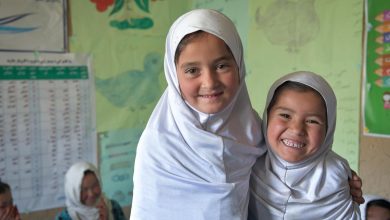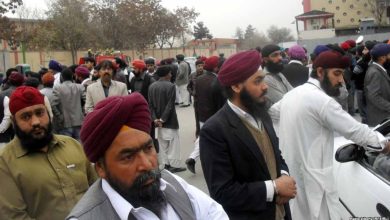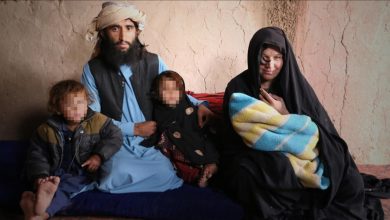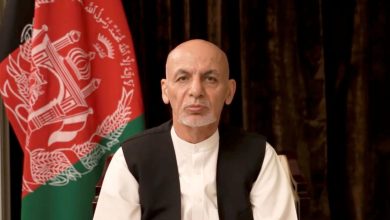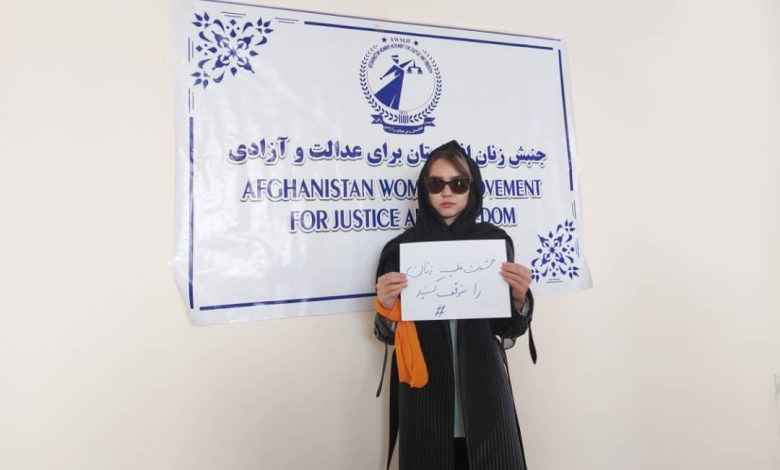
August 15 (1); Azadah: “After two years, I still live in fear”
Sughra Sadat
Bayan News – Pari Azadah, a social activist and one of the protesting women, says she has lived the past two years in a state of anxiety and fear and has not yet adapted to the current social conditions.
This report focuses on Azadah’s two-year life under the re-established Islamic Emirate of Afghanistan. After the collapse of the republic on August 15, 2021 AD and the dominance of the Islamic Emirate, the lives of women and girls in Afghanistan have changed in social, political, and cultural spheres, and a dark future has cast a shadow over them.
Over the past two years, the Islamic Emirate has imposed strict measures against women and girls and issued numerous orders to restrict them. Prohibiting girls’ education, blocking universities for female students, banning women from working in offices, and recently, banning women’s hair salons across Afghanistan are among the most stringent measures taken by the Islamic Emirate against women and girls.
These strict measures faced national and international opposition and protests, and women and girls often flocked to the streets in Kabul. However, they were eventually violently suppressed, and at the international level, reactions were stirred, and some European countries sanctioned some of the senior officials of the Islamic Emirate in connection with these actions.
But these reactions and protests have remained fruitless, and the Islamic Emirate has not retreated from its policies.
In this report, we went to Peri Azadah to evaluate her two-year life. She does not allow me to take pictures and answers my questions with a disheveled appearance. At the same time, when I understand her words, I see that she has no hope for a better future for women and girls in Afghanistan.
Azadah says she has spent the past two years in harsh conditions and in a state of fear and terror, and she is not even willing to leave her house.
She briefly recounts a part of her life: “These two years were terrible for me personally. When I go out, I feel bad and have a hard time convincing myself to go out and do my daily tasks. When I go out, I am very stressed and forced to wear clothes that I don’t like.”
Azadah talks about her first encounter with the security forces of the Islamic Emirate when the restrictions on girls’ education were just imposed, and the gates of schools and universities were closed. She says that when she had a book in her arms, the Islamic Emirate forces chased her, apparently having noticed which school she attended.
“When I left the school, I had a book in my arms. The security forces asked me where I was going, and I said I was going to the library, but they did not accept my words and chased me until they found the school where I was studying. Later, after a few minutes, the school manager came, and we hid in the library because the authorities were coming.”
After this event, Azadah did not return to any school and became indifferent to education. “Because of this, I gave up going to school so that I would not be humiliated and stressed.”
Participation in the first street protest
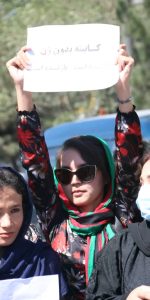
With the imposition of educational restrictions by the interim government of Kabul, the first street protests by women and girls took place in the west of Kabul, and Azadah was present in the first free protest. She shares a picture of her participation in this protest with Bayan News reporter.
Azadah, who says she was subjected to violence and mistreatment during the protests, adds that her life has been more stressful and fearful since then, fearing that she might be arrested.
She sees the future of Afghan women and girls in these uncertain and dark conditions and believes that they have been forgotten by the global community. While Azadah finds the current situation unbearable, she is concerned that the social conditions for women and girls will worsen.
Although the conditions have become difficult, Azadah believes that women and girls should not stop or give up. Instead, they should view the current restrictions and limitations as an opportunity to increase their capacity and strive to make the most of them.
Azadah believes, “Let’s consider the past two years as our license to think and elevate our capacity. Let’s make good use of these licenses. Let’s learn so that we don’t stop. If there is no opportunity for work or education today, we can work and learn online.”



